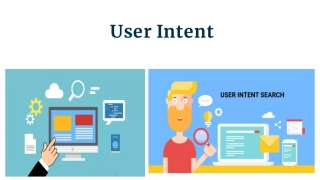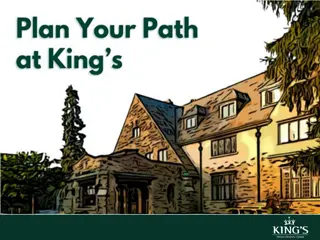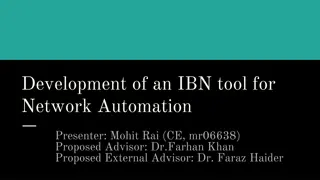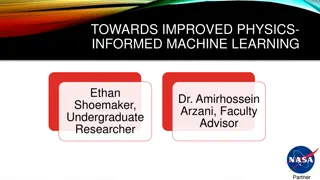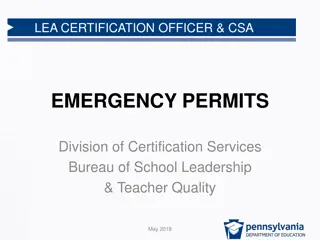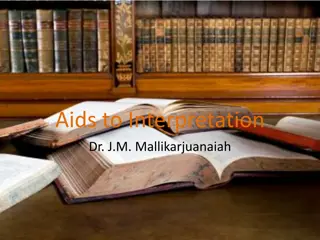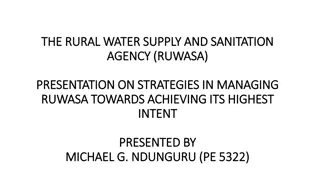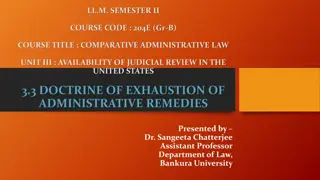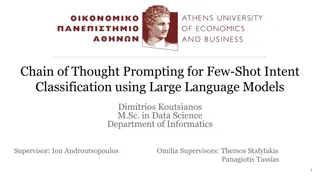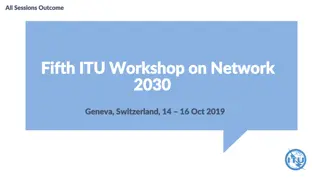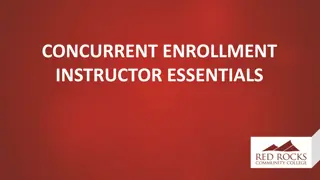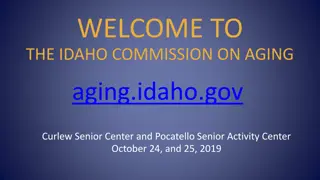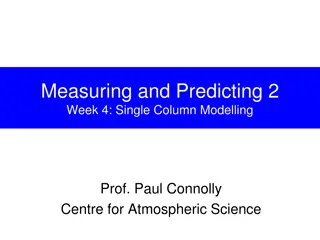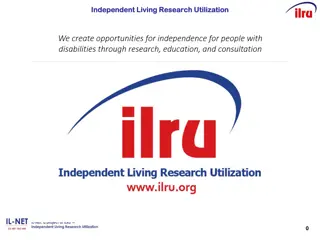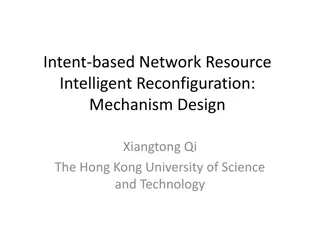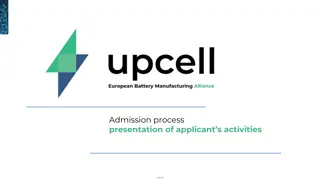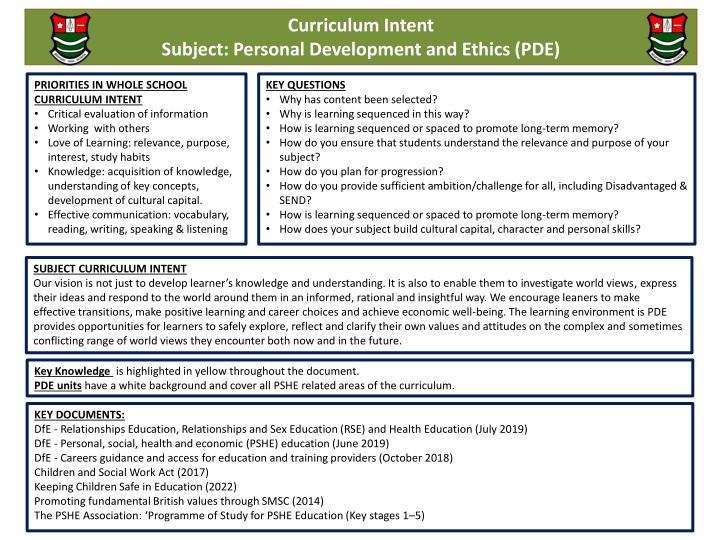
Key Stage 3 Personal Development and Ethics Curriculum Plan
Explore the Key Stage 3 curriculum plan for Personal Development and Ethics (PDE), focusing on fostering critical evaluation, understanding of key concepts, and the development of cultural capital. Students delve into religious communities, moral considerations, and social awareness. This curriculum aims to cultivate informed, rational, and insightful individuals ready to engage with diverse world views.
Download Presentation

Please find below an Image/Link to download the presentation.
The content on the website is provided AS IS for your information and personal use only. It may not be sold, licensed, or shared on other websites without obtaining consent from the author. If you encounter any issues during the download, it is possible that the publisher has removed the file from their server.
You are allowed to download the files provided on this website for personal or commercial use, subject to the condition that they are used lawfully. All files are the property of their respective owners.
The content on the website is provided AS IS for your information and personal use only. It may not be sold, licensed, or shared on other websites without obtaining consent from the author.
E N D
Presentation Transcript
Curriculum Intent Subject: Personal Development and Ethics (PDE) PRIORITIES IN WHOLE SCHOOL CURRICULUM INTENT Critical evaluation of information Working with others Love of Learning: relevance, purpose, interest, study habits Knowledge: acquisition of knowledge, understanding of key concepts, development of cultural capital. Effective communication: vocabulary, reading, writing, speaking & listening KEY QUESTIONS Why has content been selected? Why is learning sequenced in this way? How is learning sequenced or spaced to promote long-term memory? How do you ensure that students understand the relevance and purpose of your subject? How do you plan for progression? How do you provide sufficient ambition/challenge for all, including Disadvantaged & SEND? How is learning sequenced or spaced to promote long-term memory? How does your subject build cultural capital, character and personal skills? SUBJECT CURRICULUM INTENT Our vision is not just to develop learner s knowledge and understanding. It is also to enable them to investigate world views, express their ideas and respond to the world around them in an informed, rational and insightful way. We encourage leaners to make effective transitions, make positive learning and career choices and achieve economic well-being. The learning environment is PDE provides opportunities for learners to safely explore, reflect and clarify their own values and attitudes on the complex and sometimes conflicting range of world views they encounter both now and in the future. Key Knowledge is highlighted in yellow throughout the document. PDE units have a white background and cover all PSHE related areas of the curriculum. KEY DOCUMENTS: DfE - Relationships Education, Relationships and Sex Education (RSE) and Health Education (July 2019) DfE - Personal, social, health and economic (PSHE) education (June 2019) DfE - Careers guidance and access for education and training providers (October 2018) Children and Social Work Act (2017) Keeping Children Safe in Education (2022) Promoting fundamental British values through SMSC (2014) The PSHE Association: Programme of Study for PSHE Education (Key stages 1 5)
Personal Development and Ethics (PDE) Curriculum Plan Key Stage 3
Personal Development and Ethics (PDE) Curriculum Plan Key Stage 4
YEAR 7 CONCEPTS and LITERACY Personal Development KNOWLEDGE SKILLS RATIONALE Analysis of the distinctive features of religious communities and identifying between religious belief and practice. The features of the six major world religious are key to accessing much of the KS3 and KS4 curriculum. Key Knowledge, Concepts and Vocabulary: SMSC: Spiritual: Reflect upon the value of themselves and other in a community. 7A. Religious Education Introduction to Communities Community Belonging Stewardship Symbolism Tradition Community Founder Festival Pilgrimage Moral: Consider the morality of obeying religious traditions when it conflicts with religious law. 1.What is a community? The term community allows pupils to investigate different communities and reflect upon their own identify and belonging. Investigation of the diversity and the issues faced by religious communities. 2.Who are founders and what similarities do they share? Social: Demonstrate knowledge and understanding of the distinctive features of religious and non- religious communities. 3.What is a religious community? (Taiz ) Developing religious literacy allowing pupils to understand some religious concepts. Familiarisation and practice using key GCSE command words such as: describe; explain; discuss. 4.What is a festival and what are the features of festivals? Term 1 Debating and discussion skills: speaking and listening; writing to inform. This unit is perfect as the first unit at BHS as it allows pupils to develop their own sense of belonging to their new school community. Cultural: Consider the challenges faced by religious communities, practising their faith in a different culture/secular society. 5. Case Study: Iona. What is Iona and why do so people go there? 6. Assessment BV: Individual liberty; Tolerance and respect.
YEAR 7 CONCEPTS and LITERACY Personal Development KNOWLEDGE SKILLS RATIONALE Analysis and evaluation the different perceptions of a religious founder. An understanding of the life work and claims about Jesus are essential as a foundation for further work in KS3 and in GCSE RS. Key Knowledge, Concepts and Vocabulary: SMSC: Spiritual: Give a personal response to the question, Who was Jesus? 7B. Religious Education Who was Jesus? Ascension Crucifixion Existence Ministry Miracle Resurrection Investigation and research into questions about Jesus existence, life, work and resurrection 1. Introduction fact or fiction? The terms used in the unit form a foundation for religious understanding and literacy. Moral: Consider the influence of Jesus life and teachings on people s lives today. 2. Was Jesus a rebel? Explore, describe and evaluate some of the miracles performed by Jesus and what impact these narratives have in the modern world. 3. Was Jesus able to perform miracles? Familiarisation and practice using key GCSE command words such as: describe; explain; discuss. Social: Explore the importance of Jesus, as the founder of Christianity, in the modern world. 4. Who was the Good Samaritan? Pupils are encouraged to think for themselves about some of the issues surrounding Jesus in a supportive and academic environment. This open mindedness will develop understanding of religion and wider society.. Term 2 5. What is meant by the resurrection of Jesus? Develop religious literacy allowing pupils to understand founders and followers. Cultural: Reflect on how Jesus is portrayed in different religious and non-religious communities. 6. Case Study: what is the truth behind the story of the Turin Shroud? Debating and discussion skills: speaking and listening; writing to inform on topical areas such as the Turin Shroud and the resurrection. 7. Assessment BV: This unit highlights mutual respect for, and tolerance of people with faith, and for those without faith. Other British Values are also evident in this unit.
YEAR 7 CONCEPTS and LITERACY Personal Development KNOWLEDGE SKILLS RATIONALE Analysis and investigation of the issue. An understanding of the issue and how it impacts the student and the wider community. 7C. Health Education: Key concepts and vocabulary: SMSC: Spiritual: Reflect on physical fitness and what contributes to a healthy body such as healthy eating and good dental hygiene. a. b. Physical Health Healthy Eating Healthy Lifestyle Hydration Dehydration Hygiene Puberty Risk management Develop and increase their understanding of risk management and how it applies to this issue. The terms used in the unit form the basis of a better developed understanding and self reflection. 1. What do we mean by a healthy lifestyle? Investigation of a range of diverse views about this issue to develop mutual respect and understanding. Moral: Apply the consequences of not gaining and maintaining a healthy body. 2. Consequences of not living healthy. Pupils are encouraged to think for themselves, analyse the key issues and manage risk associated with it. 3. Dental Hygiene Increase employability skills and develop an understanding of how this issue impacts work roles and identities. Social: Explore the impact of gaining and maintain a healthy body through sports club and social groups. Term 1 4. Puberty This unit enables pupils to investigate, analyse and discuss the issue in a way that promotes self reflection and a mutual respect of diverse views. Practicing debating and discussion skills: speaking and listening; writing to inform. Cultural: Explore the benefits of a healthy body. A critical understanding of the issue will enable students to become rounded citizens and develop wider employability skills. BV:. This unit highlights the individual liberty people have to make decisions that will positively or negatively affect their health.
YEAR 7 CONCEPTS and LITERACY Personal Development KNOWLEDGE SKILLS RATIONALE Analysis and investigation of the issue. An understanding of the issue and how it impacts the student and the wider community. 7D. Relationships and Sex Education: Key concepts and vocabulary: SMSC: Spiritual: Develop and Reflect on modern families and relationships and the effect they have on individuals. Relationships Contentment Family Positive relationship Unhealthy relationship Cyberbullying Risk management Develop and increase their understanding of risk management and how it applies to this issue. FAMILIES AND RELATIONSHIPS The terms used in the unit form the basis of a better developed understanding and self reflection. 1. Modern families, relationships and happiness Investigation of a range of diverse views about this issue to develop mutual respect and understanding. Moral: Apply the law to different scenarios surrounding the issue. 2. Healthy and positive relationships Pupils are encouraged to think for themselves, analyse the key issues and manage risk associated with it. Social: Explore the impact of unsafe and unhealthy relationships on individuals. 3. Unsafe and virtual relationships Increase employability skills and develop an understanding of how this issue impacts work roles and identities. Term 3 4. Relationships and the Law This unit enables pupils to investigate, analyse and discuss the issue in a way that promotes self reflection and a mutual respect of diverse views. Cultural: Explore how families and relationships mirror the cultural trends of society. 5. Cyber Bullying Practicing debating and discussion skills: speaking and listening; writing to inform. A critical understanding of the issue will enable students to become rounded citizens and develop wider employability skills. BV:. This unit directly links to the rule of law, it also highlights the personal liberty of individuals. Other British Values are also evident in this unit.
YEAR 7 CONCEPTS and LITERACY Personal Development KNOWLEDGE SKILLS RATIONALE Enquire and research into diverse beliefs and practices Hinduism The understanding of the features and impact of belief and practice on Hindu life and the wider impact on world views. Key Knowledge, Concepts and Vocabulary: SMSC: Spiritual: Share thoughts and feelings concerning the caste system. 7E. Religious Education What does it mean to be Hindu? Hindu Brahman Trimurti Reincarnation Karma Moksha Atman Samsara Dharma Ahimsa Diwali Holi Caste system Investigate the impact Hindu beliefs and practices have on a Hindus daily life. Knowledge of issues such as the Hindu Gods and the caste system provide cultural points of reference enabling pupils to understand issues surrounding life as a Hindu in modern Britain. Moral: Consider the morality of the caste system. 1. Introduction to Hinduism. Examine and evaluate the culture of India and the challenges the Hindu faith faces in the 21st century. 2. Hindu Gods Social: Explore the impact of Hindu belief on a Hindus daily life. Students should be able to demonstrate knowledge and understanding of the religious beliefs and practices of Hinduism and enquire into and explain the relationship between Hinduism and the culture of India. 3. Festivals Holi Describe and explain the distinctive features of Hindu worship, their symbolism and meaning. Cultural: Explore the relationship between Hindu culture and the beliefs and practices of Hinduism. 4. Worship Puja Term 3 5. Life and Death Samsara. Develop a detailed knowledge and understanding of significant features of Hindu life, such as rites of passage, family and festival celebrations. Students should be able t Explain the concept of God in Hinduism, enquire into, ask questions and suggest reasons in relation to Hindu belief and practice. BV: This unit highlights mutual respect for, and tolerance of people with faith, and for those without faith. Other British Values are also evident in this unit. 6. Caste System 7. Case Study: Comparing similarities and differences between religions. 8. Assessment Students should be able to express opinions in a informed, rational and insightful way, reflecting on personal thoughts, feelings and beliefs with regard to life after death, the existence of God and equality.
YEAR 7 CONCEPTS and LITERACY Personal Development KNOWLEDGE SKILLS RATIONALE Analysis and investigation of the issue. An understanding of the issue and how it impacts the student and the wider community. 7F Relationships and Sex Education (RSE): Key concepts and vocabulary: SMSC: Spiritual: Reflect on the impact of stereotypes on individuals. Prejudice Discrimination Stereotype Scapegoat Harassment Equality Sexual Harassment Develop and increase their understanding of risk management and how it applies to this issue. DIVERSITY AND DISCRIMINATION The terms used in the unit form the basis of a better developed understanding and self reflection. Moral: Apply the law to different scenarios surrounding the issue. 1. Stereotypes - breaking them down Investigation of a range of diverse views about this issue to develop mutual respect and understanding. Social: Explore the impact of stereotypes on individuals. Pupils are encouraged to think for themselves, analyse the key issues and manage risk associated with it. 2. Stereotypes - prejudice and disability Increase employability skills and develop an understanding of how this issue impacts work roles and identities. Cultural: Explore and explain how the law reflects cultural understanding. 3. Stereotypes - prejudice and racism Term 2 This unit enables pupils to investigate, analyse and discuss the issue in a way that promotes self reflection and a mutual respect of diverse views. 4. Stereotypes - sexism and gender BV:. This unit directly links to the rule of law, it also highlights the personal liberty of individuals. Other British Values are also evident in this unit. Practicing debating and discussion skills: speaking and listening; writing to inform. 5. Equality, sexual harassment and the law - Equality Act 2010 A critical understanding of the issue will enable students to become rounded citizens and develop wider employability skills.
YEAR 7 CONCEPTS and LITERACY Personal Development KNOWLEDGE SKILLS RATIONALE Analysis and investigation of the issue. An understanding of the issue and how it impacts the student and the wider community. 7G Relationships and Sex Education (RSE): Key concepts and vocabulary: SMSC: Spiritual: Reflect on the impact of puberty on individuals. Puberty Risk Risk Management Relationship Consent Develop and increase their understanding of risk management and how it applies to this issue. PUBERTY The terms used in the unit form the basis of a better developed understanding and self reflection. Moral: Apply the law and pupil understanding about consent to different scenarios. HEALTHY RELATIONSHIPS Investigation of a range of diverse views about this issue to develop mutual respect and understanding. RISK AND CONSENT Pupils are encouraged to think for themselves, analyse the key issues and manage risk associated with it. Social: Explore the positive impact of risk management. Spectrum CIC Increase employability skills and develop an understanding of how this issue impacts work roles and identities. Term 3 Cultural: Explore the positive aspects on a changing body. This unit enables pupils to investigate, analyse and discuss the issue in a way that promotes self reflection and a mutual respect of diverse views. BV:. This unit highlights mutual respect for, and tolerance of people with faith, and for those without faith. Other British Values are also evident in this unit. Practicing debating and discussion skills: speaking and listening; writing to inform. A critical understanding of the issue will enable students to become rounded citizens and develop wider employability skills.
YEAR 8 CONCEPTS and LITERACY Key concepts and vocabulary: KNOWLEDGE SKILLS RATIONALE Personal Development Analysis of the distinctive features of religious communities and identifying between religious belief and practice. An understanding of the issue and how it impacts the student and the wider community. SMSC: Spiritual: Consider financial choices and how they affect individuals. 8A. Living in a Wider World (WW): Risk Budget Ethical Debt Decisions Challenges Influences Emotions FINANCIAL CHOICES The terms used in the unit form the basis of a better developed understanding and self reflection. Moral: Apply knowledge to making moral decisions about the production of goods. 1. Financial Decisions: income and expenditure Investigation of the diversity and the issues faced by religious communities. 2. Money: values and attitudes (including debt) Pupils are encouraged to think for themselves, analyse the key issues and manage risk associated with it. Social: Explore the impact of financial exploitation on individuals. Developing religious literacy allowing pupils to understand some religious concepts. 3. Emotions and money: our wants and needs (including BUDGETING). Cultural: Explore how families and relationships are affected by debt. This unit enables pupils to investigate, analyse and discuss the issue in a way that promotes self reflection and a mutual respect of diverse views. Term 3 Debating and discussion skills: speaking and listening; writing to inform. 4. Social and moral dilemmas (including advertising and peers) BV:. This unit directly links to the rule of law, it also highlights the personal liberty of individuals. Other British Values are also evident in this unit. 5. Financial exploitation in different contexts (including drug and money mules, online scams) A critical understanding of the issue will enable students to become rounded citizens and develop wider employability skills.
YEAR 8 CONCEPTS and LITERACY Key Knowledge, Concepts and Vocabulary: KNOWLEDGE SKILLS RATIONALE Personal Development Enquire and research diverse beliefs and practices in Islam and explaining how Muslims put their faith into action. The understanding of the Sikh belief and practices develops cultural capital for life in a diverse Britain. 8B. Religious Education SMSC: Spiritual: Reflect on values and beliefs in respect of Zakat, and caring for others. What does it mean to be Muslim? Charity Fasting Five Pillars Pilgrimage Prayer Ummah Investigate the symbols worn and special journeys made by Muslim and how they are received in the modern world. 1. Introduction to Islam: What do Muslims believe? What is it like to be a Muslim in modern Britain? Knowledge of issues arising from different beliefs about God and community help in debates about such issues in future life. Moral: Explore the challenges the Islamic faith faces in a secular society, especially in respect of traditional dress. Examine and evaluate the importance of charity, prayer and fasting to Muslims. 2. What are the Five Pillars of Islam? Make links between key Islamic beliefs and actions and explain the impact on the lives of believers and the challenges of keeping the Five Pillars in a secular or different culture. Understanding the impact of belief and practices about community and belonging help pupils to reflect on their own identity and sense of belonging. Social: Explore the impact of the Five Pillars on a Muslim s daily life. 3. What is Halal and Haram and why is it important to Muslims? Term 1 Cultural: Compare and contrast the Quran as a sources of authority and how this impacts on Muslim's in a religious and non religious society. Discuss debate, analyse and evaluate different arguments from religion and belief in respect of the wearing of the Hijab, Niqab or Burka by some Muslim women in the 21st century. 4. What is a mosque like? Familiarisation and practice using key GCSE command words such as: describe; explain; discuss. 5. Sources of Authority What is the Qur an and why is it important today? BV: This unit highlights mutual respect for, and tolerance of people with faith, and for those without faith. Other British Values are also evident in this unit. Analyse and explain what Islamophobia is and explain the reasons for it and the impact on the Islamic community 6. Contemporary issue: why do Muslim women wear a Hijab? Describe and explain the significant features of Muslim , such as rites of passage, family and festival celebrations. 7. Case Study: Who was Malcom X? 8. Assessment
YEAR 8 CONCEPTS and LITERACY Personal Development KNOWLEDGE SKILLS RATIONALE Analysis and investigation of the issue. An understanding of the issue and how it impacts the student and the wider community. 8C. Relationships and Sex Education (RSE): Key concepts and vocabulary: SMSC: Spiritual: Develop and reflect on the issues and impact of social media on individuals, friends and families. Risk Management Pornography Grooming Personal Digital Material Data collection, sharing and use. Digital footprint Develop and increase their understanding of risk management and how it applies to this issue. ONLINE AND MEDIA 1. Social Media The terms used in the unit form the basis of a better developed understanding and self reflection. 2. Screen Time Moral: Apply knowledge and the law to pornography and indecent images. Investigation of a range of diverse views about this issue to develop mutual respect and understanding. 3. Selfies and Sharing Pupils are encouraged to think for themselves, analyse the key issues and manage risk associated with it. 4. Pornography and indecent images Social: Explore the impact of unsafe and unhealthy use of online and media platforms. Increase employability skills and develop an understanding of how this issue impacts work roles and identities. 5. Digital Footprint Term 2 This unit enables pupils to investigate, analyse and discuss the issue in a way that promotes self reflection and a mutual respect of diverse views. Cultural: Explore the impact of online and media platforms on society. Practicing debating and discussion skills: speaking and listening; writing to inform. A critical understanding of the issue will enable students to become rounded citizens and develop wider employability skills. BV:. This unit directly links to individual liberty and the rule of law. Other British Values are also evident in this unit.
YEAR 8 CONCEPTS and LITERACY Key Knowledge, Concepts and Vocabulary: KNOWLEDGE SKILLS RATIONALE Personal Development Enquire and research into a diverse range of ultimate questions. The understanding of the potential impact of ultimate questions on personal belief belief and practice in a religious and non-religious society. SMSC: Spiritual: Give opinions and share beliefs and responses to ultimate questions. 8D. Religious Education How do people respond to Ultimate Questions? Creation Design Evil Reason Science Suffering Ultimate Question Atheist Agnostic Theist. Examine and evaluate the impact of ultimate questions to key religious and secular concepts. Moral: Evaluate the responses to ultimate questions from religion and belief. Knowledge of ultimate questions such How did the world begin? Consider religious teachings and scientific theories on how the world began. Look at literalist and non-literalist interpretations of the Creation stories. What is an ultimate question? Discuss debate, analyse and evaluate the responses to ultimate questions, from religion and belief. Social: Explore how different faith communities respond to ultimate questions. What concepts from religion and belief can be applied? Describe and explain the significance of some ultimate questions to big questions surrounding the origin of the universe and origins of evil. Cultural: Consider the influence of religious traditions and culture when exploring answers to ultimate questions. Term 2 Familiarisation and practice using key GCSE command words such as: describe; explain; discuss. How can we respond to ultimate questions. Comparing similarities and differences between religions. BV: This unit highlights the freedom and liberty to choose chose between religious and non-religious or scientific theories to explain the big questions . It also promotes mutual respect for, and tolerance of people with faith, and for those without faith. Other British Values are also evident in this unit. Explore, describe and evaluate the impact of ultimate questions in the modern world. How doe ultimate questions influence individuals, communities, society and the law. Reflect on personal thoughts, feelings and beliefs with regard to ultimate questions, sharing them with others
YEAR 8 CONCEPTS and LITERACY Key Knowledge, Concepts and Vocabulary: KNOWLEDGE SKILLS RATIONALE Personal Development 8E. Religious Education: Enquire and research into a diverse range of ultimate questions. The understanding of the potential impact of ultimate questions on personal belief belief and practice in a religious and non-religious society. SMSC: Spiritual: Explore and express personal spirituality and creativity through art. Spirited Arts Expression Faith Art Music Worship. Belief Examine and evaluate the impact of ultimate questions to key religious and secular concepts. 1. God in Art 1 Moral: Explore the rights and wrongs of using images in worship. 2. God in Art 2 Knowledge of ultimate questions such How did the world begin? Consider religious teachings and scientific theories on how the world began. Look at literalist and non-literalist interpretations of the Creation stories. 3. God in Music 1 Discuss debate, analyse and evaluate the responses to ultimate questions, from religion and belief. Social: Enquire into the place and function of art in religious worship. 4. Project Cultural: Explore the cultural influences on religious art Describe and explain the significance of some ultimate questions to big questions surrounding the origin of the universe and origins of evil. Term 2 BV: This unit highlights mutual respect for, and tolerance of people with faith, and for those without faith through artistic expression in its various forms.Other British Values are also evident in this unit. Familiarisation and practice using key GCSE command words such as: describe; explain; discuss. Comparing similarities and differences between religions. Explore, describe and evaluate the impact of ultimate questions in the modern world. Reflect on personal thoughts, feelings and beliefs with regard to ultimate questions, sharing them with others
YEAR 8 Personal Development KNOWLEDGE CONCEPTS and LITERACY SKILLS RATIONALE Analysis and investigation of the issue. An understanding of the issue and how it impacts the student and the wider community. 8F. Relationships and Sex Education (RSE): Key concepts and vocabulary: SMSC: Spiritual: Develop and Reflect on the characteristics of positive and healthy friendships (in all contexts. Stereotype Prejudice Discrimination Equality Characteristics Equality Act 2010 Develop and increase their understanding of risk management and how it applies to this issue. IDENTITY, STEREOTYPES AND EQUALITY. The terms used in the unit form the basis of a better developed understanding and self reflection. SPECTRUM CIC Investigation of a range of diverse views about this issue to develop mutual respect and understanding. Moral: Apply Practical steps they can take in a range of different contexts to improve or support respectful relationships. 1. Identity and respect Pupils are encouraged to think for themselves, analyse the key issues and manage risk associated with it. 2. Stereotypes 3. Equality (including the protected characteristics Equality Act 2010) Increase employability skills and develop an understanding of how this issue impacts work roles and identities. This unit enables pupils to investigate, analyse and discuss the issue in a way that promotes self reflection and a mutual respect of diverse views. Social: Explore the impact of prejudice and discrimination against those with protected characterises. Term 2 Practicing debating and discussion skills: speaking and listening; writing to inform. Cultural: Explore how identity, stereotypes and issues of equality mirror the cultural trends of society. A critical understanding of the issue will enable students to become rounded citizens and develop wider employability skills. BV:. This unit directly links to the rule of law, it also highlights the personal liberty of individuals. Other British Values are also evident in this unit.
YEAR 8 CONCEPTS and LITERACY Personal Development KNOWLEDGE SKILLS RATIONALE Enquire and research into diverse beliefs and practices of Buddhism. The understanding of Buddhist belief and practices develops cultural capital for life in a diverse Britain. 8G. Religious Education Key Knowledge, Concepts and Vocabulary: SMSC: Spiritual: Reflect on greed and selfishness and its impact and consequences. What does it mean to be Buddhist? Investigate the relationship of Buddhist belief and the modern world. Belief Faith Practices Reincarnation Rites of Passage Meditation Puja Mantras . 1. Introduction to Buddhism: a. How did Buddhism begin? b. Why is the Buddha important as a founder? Examine and evaluate the importance of Buddhist worship, symbolism and ideas about meaning in a religious and non- religious society. Knowledge of issues airing from different beliefs about God develop understanding to help in debates about such issues in future life. Moral: Apply the five moral precepts of Buddhism to a current moral issue. Term 3 Comparing similarities and differences between religions. Social: Explore the impact of Buddhist belief and practice and how it impacts on daily life. 2. Suffering: What are the Four Noble Truths and do they explain worldwide suffering? Describe and explain the significant features of Buddhist, such as rites of passage, family and festival celebrations. Understanding the impact of belief and practices on a modern country enables pupils to reflect on their own country and how it is affected by such issues. 3. Middle Way: What is the Eightfold Path and how does it affect the life of Buddhists? Discuss, debate, analyse and evaluate the Buddhist beliefs in the Four Noble Truths and Eightfold Path as an explanation for suffering in the world. Cultural: Explore diversity within the Buddhist faith BV:. This unit highlights mutual respect for, and tolerance of people with faith, and for those without faith. Other British Values are also evident in this unit. 4. Can the Five Precepts be applied to daily life? Demonstrate religious literacy in discussion, debate and expression of reasoned opinions when referring to key religious teachings, concepts and practices in Buddhism. Familiarisation and practice using key GCSE command words such as: describe; explain; discuss. 5. Buddhists Temples: What do Buddhist Temples look like and how are they used? Use appropriate religious vocabulary in context such as Buddhist, Buddhism, meditation, puja, mantras etc. 6. Case Study 7. Assessment.
YEAR 9 CONCEPTS and LITERACY Personal Development KNOWLEDGE SKILLS RATIONALE Analysis and investigation of the issue. An understanding of the issue and how it impacts the student and the wider community. 9A. Relationships and Sex Education: Key concepts and vocabulary: SMSC: Spiritual: Develop a knowledge of the long term impact of abuses on the individual. Consent Coercive behaviour Abuse Control Mutilation Identity Stereotype Exploitation Force Honour Develop and increase their understanding of risk management and how it applies to this issue. BEING SAFE 1. Choices: consent The terms used in the unit form the basis of a better developed understanding and self reflection. Moral: Apply the law to different scenarios surrounding thee issues, particularly coercive control. 2. Coercive Relationships: Case study - Is this coercive control? (BBC) Investigation of a range of diverse views about this issue to develop mutual respect and understanding. Pupils are encouraged to think for themselves, analyse the key issues and manage risk associated with it. 3. FGM Social: Explore the impact of unsafe and abuse behaviours on individuals. 4. Forced marriage and honour-based violence Increase employability skills and develop an understanding of how this issue impacts work roles and identities. Term 3 5. Stereotypes: gender identity and hate crimes This unit enables pupils to investigate, analyse and discuss the issue in a way that promotes self reflection and a mutual respect of diverse views. Cultural: Explore how different cultural influences impact wider society. 6. Stereotypes: violence against women and girls Practicing debating and discussion skills: speaking and listening; writing to inform. 7. Child Sexual Exploitation BV:. This unit directly links to the rule of law, it also highlights the personal liberty of individuals. Other British Values are also evident in this unit. A critical understanding of the issue will enable students to become rounded citizens and develop wider employability skills.
YEAR 9 CONCEPTS and LITERACY KNOWLEDGE SKILLS RATIONALE Personal Development Enquire and research into animals rights as a specific issue with a global impact. The understanding of the potential impact of mistreatment of animals and the environment on personal belief and practice in a religious and non-religious society. 9B. Religious Education: Key Knowledge, Concepts and Vocabulary: SMSC: Spiritual: Give opinions and share beliefs and responses to issues about animals and the environment. Religion and Global Issues - Animals and the Environment Rights Responsibilities Entertainment Education Cruelty Environment Pollution Blood Sport Examine and evaluate the impact of human activity on animals and the global environment. 1. Introduction: a. What are Animal Rights? b. Do animals really have rights? Moral: Evaluate the responses to this global issues from religion and belief. Gain an knowledge of the key issues surrounding animals and the environment and consider religious teachings. Discuss debate, analyse and evaluate the religious and non-religious responses to this issue. Social: Explore how different faith communities respond to the issues. 2. What s the point of a zoo? Describe and explain the significance of animal rights and the environment to big questions surrounding human existence. Familiarisation and practice using key GCSE command words such as: describe; explain; discuss. 3. What is the impact of human activity? Caring for Planet Earth Cultural: Consider the influence of religious traditions and culture when exploring answers to global issues. Term 2 4. What is the impact of modern lifestyles on the planet? Explore, describe and evaluate the impact of human activity on the planet. BV: This unit highlights mutual respect for, and tolerance of people with faith, and for those without faith. Other British Values are also evident in this unit. 5. Case Study: Is bullfighting a sport? Reflect on personal thoughts, feelings and beliefs with regard to key issues about animals and the environment. 6. Assessment
YEAR 9 CONCEPTS and LITERACY Personal Development KNOWLEDGE SKILLS RATIONALE Analysis and investigation of the issue. An understanding of the issue and how it impacts the student and the wider community. 9C.1. Relationships and Sex Education (RSE) Key concepts and vocabulary: SMSC: Spiritual: Develop and reflect on modern families and relationships and the effect they have on individuals. Friendship Trust Abuse Stereotype Harassment Develop and increase their understanding of risk management and how it applies to this issue. RESPECTFUL RELATIONSHIPS INCLUDING FRIENDSHIPS The terms used in the unit form the basis of a better developed understanding and self reflection. 1. Friendships Investigation of a range of diverse views about this issue to develop mutual respect and understanding. Moral: Apply the knowledge to different scenarios around the issue. 2. Trust in Families and Conflict Pupils are encouraged to think for themselves, analyse the key issues and manage risk associated with it. 3. Domestic Violence Increase employability skills and develop an understanding of how this issue impacts work roles and identities. Social: Explore the impact of unsafe and unhealthy relationships on individuals and families. 4. Cyber-bullying Term 1 This unit enables pupils to investigate, analyse and discuss the issue in a way that promotes self reflection and a mutual respect of diverse views. 5. Stereotypes and Harassment: sexism Practicing debating and discussion skills: speaking and listening; writing to inform. Cultural: Explore how these issues reflect the cultural trends of society. A critical understanding of the issue will enable students to become rounded citizens and develop wider employability skills. BV:. This unit directly links to the rule of law, it also highlights the personal liberty of individuals. Other British Values are also evident in this unit.
YEAR 9 CONCEPTS and LITERACY Personal Development KNOWLEDGE SKILLS RATIONALE Analysis and investigation of the issue. An understanding of the issue and how it impacts the student and the wider community. 9C.2. Health Education: Key concepts and vocabulary: SMSC: Spiritual: Develop an understanding of risks associated with online activities and the impact of them on individuals, friends and families. INTERNET SAFETY AND HARM Digital Debt Internet Fraud Scam Harassment Develop and increase their understanding of risk management and how it applies to this issue. The terms used in the unit form the basis of a better developed understanding and self reflection. 1. Image real vs fake 2. Online Gambling and Debt Investigation of a range of diverse views about this issue to develop mutual respect and understanding. Moral: Apply knowledge and understanding to different scenarios surrounding the issue. Pupils are encouraged to think for themselves, analyse the key issues and manage risk associated with it. 3. Internet Safety and the Dark Web . Increase employability skills and develop an understanding of how this issue impacts work roles and identities. Social: Explore the impact of unsafe use of social media and the internet. 4. Cyber-crime and online fraud. Term 2 This unit enables pupils to investigate, analyse and discuss the issue in a way that promotes self reflection and a mutual respect of diverse views. 5. Harmful behaviours cyber-bullying Cultural: Explore how Internet harm can sometimes reflect cultural trends of society. Practicing debating and discussion skills: speaking and listening; writing to inform. A critical understanding of the issue will enable students to become rounded citizens and develop wider employability skills. BV:. This unit directly links to the personal liberty of individuals. Other British Values are also evident in this unit.
YEAR 9 CONCEPTS and LITERACY KNOWLEDGE SKILLS RATIONALE Personal Development Enquire and research into diverse beliefs and practices. The understanding of the features and impact of belief and practice on Jewish life are vital to religious understanding and for later study in GCSE. Key Knowledge, Concepts and Vocabulary: SMSC: Spiritual: Respond to the events of the Holocaust and express personal thoughts and feelings. 9D. Religious Education What does it mean to be Jewish? Investigate anti-Semitism and how its impact on the Jewish community, past and present. Anti-Semitism Celebration Diversity Holocaust Rites of passage Ssymbols Identity Shabbat Kosher 1. Introduction to Judaism: a. Where did Judaism begin? b. What is it like to be Jewish in modern Britain? Moral: Explore the roles of men and women in the Jewish faith. Reflect on personal thoughts, feelings with regard to anti- Semitism and the events of the Holocaust. Knowledge of issues such as anti-Semitism and the Holocaust provide cultural points of reference to enable pupils to understand issues of discrimination in the past and present. Social: Explore the role and importance of the family and the home in Judaism. Identify and explain diversity within the Jewish community and the reasons for it. 2. Why is Jerusalem so important to Jews? Cultural: Explore diversity within the Jewish faith and the influence of culture on belief and practice. 3. What are the Jewish holy texts and what do they say? Term 3 Discuss debate, analyse and evaluate the role of sacred texts as a source of authority in the modern world. Familiarisation and practice using key GCSE command words such as: describe; explain; discuss. 4. What is the most important day of the week for Jews? BV: This unit highlights mutual respect for, and tolerance of people with faith, and for those without faith. Other British Values are also evident in this unit. he synagogue and the home in Jewish life and worship. 5. Why and how do Jews celebrate their most important festivals? The unit provides a basis of knowledge that will be developed and used at GCSE. Demonstrate religious literacy in discussion, debate and expression of reasoned opinions when referring to key religious teachings, concepts and practices in Judaism. 6. Case Study: How did one man smash the Orthodox Jewish stereotype? 7. Assessment Comparing similarities and differences between religions.
YEAR 9 CONCEPTS and LITERACY Personal Development KNOWLEDGE SKILLS RATIONALE Analysis and investigation of the issue. An understanding of the issue and how it impacts the student and the wider community. 9E. Relationships and Sex Education (RSE); Key concepts and vocabulary: SMSC: Spiritual: Develop an understanding of contraception and STIs to individuals. Consent Contraception Consequences Capacity Exploitation Choice Capacity Develop and increase their understanding of risk management and how it applies to this issue. RELATIONSHIPS AND CONSENT, RISK TAKING BEHAVIOURS, CONTRACEPTION, SEXUAL HEALTH. The terms used in the unit form the basis of a better developed understanding and self reflection. Moral: Apply the law to different scenarios surrounding the issue, in particular consent. Investigation of a range of diverse views about this issue to develop mutual respect and understanding. Spectrum CIC 1. Relationships and Consent Pupils are encouraged to think for themselves, analyse the key issues and manage risk associated with it. Social: Explore the impact of unsafe and unhealthy behaviours and their long term consequences. Cultural: Explore how these issue often attract mirror the cultural trends. Increase employability skills and develop an understanding of how this issue impacts work roles and identities. Term 2 2. Risk Taking Behaviours This unit enables pupils to investigate, analyse and discuss the issue in a way that promotes self reflection and a mutual respect of diverse views. 3. Contraception 4. Sexual Health Practicing debating and discussion skills: speaking and listening; writing to inform. BV:. This unit directly links to the rule of law, it also highlights the personal liberty of individuals. Other British Values are also evident in this unit. A critical understanding of the issue will enable students to become rounded citizens and develop wider employability skills.
YEAR 9 CONCEPTS and LITERACY Key Knowledge, Concepts and Vocabulary: KNOWLEDGE SKILLS RATIONALE Personal Development Analysis of the distinctive features of Christianity with reference to its beliefs and traditions. The features of the six major world religious are key to accessing much of the KS3 and KS4 curriculum. SMSC: Spiritual: Explore the meaning and value of prayer and share personal experiences. 9F. Religious Education What does it mean to be a Christian? Belief Faith Practices Eucharist/Communion Private prayer Public prayer Gospel Meditation Investigation, analyse and explain the distinctive elements of Christian worship. Moral: Explore the role of women in the church. The term community allows pupils to investigate different communities and reflect upon their own identify and belonging. 1. Christian Diversity Developing religious literacy allowing pupils to understand some religious concepts. 2. The Church Social: Research aspects of the Christian lifestyle and make links between beliefs and practice. 3. Worship Discuss debate, analyse and evaluate the influence of religion and belief with regard to a current or moral issue in Christianity such as the controversial issue of women priests. 4. Prayer Familiarisation and practice using key GCSE command words such as: describe; explain; discuss. Cultural: Reflect on the influence of Christianity on British culture, past and present. 5. The Bible Term 3 6. Case Study: women in the church Debating and discussion skills: speaking and listening; writing to inform. BV: This unit highlights mutual respect for, and tolerance of people with faith, and for those without faith. Other British Values are also evident in this unit. This unit is perfect as the first unit at BHS as it allows pupils to develop their own sense of belonging to their new school community. Development and use of religious literacy and vocabulary in context such as Altar, Pulpit, Lectern, Font, Baptistery, Prayer, Sermon, Eucharist, Bible etc. .
YEAR 10 CONCEPTS and LITERACY KNOWLEDGE SKILLS RATIONALE Personal Development Analysis and investigation of the issue. An understanding of the issue and how it impacts the student and the wider community. Key Knowledge, Concepts and Vocabulary: SMSC: Spiritual: Give opinions and share beliefs and responses to issues about religion, crime and punishment. 10A. Religious Education Religion, Crime and Punishment Develop and increase their understanding of risk management and how it applies to this issue. Crime Aim(s) of Punishment Retribution Reformation Deterrence Protection Vindication. The terms used in the unit form the basis of a better developed understanding and self reflection. Moral: Evaluate the responses to the issues surrounding such as the use of the death penalty in the modern world. 1. What are the different types of crime and what are their causes? Social: Explore a range of different responses to the issues that can be either religious or non-religious in a diverse society. 2. Why does society punish law breakers? Investigation of a range of diverse views about this issue to develop mutual respect and understanding. Pupils are encouraged to think for themselves, analyse the key issues and manage risk associated with it. 3. What is the death penalty and why is it still used in some countries? (1 of 2) Cultural: Consider the influence of religious traditions and culture when exploring issues about crime and punishment. Term 1 Increase employability skills and develop an understanding of how this issue impacts work roles and identities. This unit enables pupils to investigate, analyse and discuss the issue in a way that promotes self reflection and a mutual respect of diverse views. 4. What is the death penalty and why is it still used in some countries? (2 of 2) BV: This unit highlights several aspects of British Values, in particular the rule of law and individual liberty. Other British Values are also evident in this unit. Practicing debating and discussion skills: speaking and listening; writing to inform. A critical understanding of the issue will enable students to become rounded citizens and develop wider employability skills. 5. Case Study: Derek Bentley 6. Was Corporal Punishment effective in the UK? 7. Assessment
YEAR 10 CONCEPTS and LITERACY KNOWLEDGE SKILLS RATIONALE Personal Development 10B.Relationships and Sex Education: Analysis and investigation of the issue. An understanding of the issue and how it impacts the student and the wider community. Key concepts and vocabulary: SMSC: Spiritual: Develop an understanding of benefits and dangers associated with intimate relationships. INTIMATE SEXUAL RELATIONSHIPS, INCLUDING SEXUAL HEALTH (1). Intimate Choices Delay Pressure Harassment Coercive Control Develop and increase their understanding of risk management and how it applies to this issue. The terms used in the unit form the basis of a better developed understanding and self reflection. Moral: Apply the law to different scenarios surrounding the issue, in particular consent and coercive control. 1. Choice: consent, delay, sexual pressure Investigation of a range of diverse views about this issue to develop mutual respect and understanding. Pupils are encouraged to think for themselves, analyse the key issues and manage risk associated with it. 2. Friendships and intimate relationships Social: Explore the impact of unsafe and unhealthy intimate relationships and their long term consequences. Cultural: Explore how these issues often attract mirror the cultural trends. Term 1 Increase employability skills and develop an understanding of how this issue impacts work roles and identities. This unit enables pupils to investigate, analyse and discuss the issue in a way that promotes self reflection and a mutual respect of diverse views. 3. Coercive Control Practicing debating and discussion skills: speaking and listening; writing to inform. A critical understanding of the issue will enable students to become rounded citizens and develop wider employability skills. BV:. This unit directly links to the rule of law, it also highlights the personal liberty of individuals. Other British Values are also evident in this unit.
YEAR 10 CONCEPTS and LITERACY Key Knowledge, Concepts and Vocabulary: KNOWLEDGE SKILLS RATIONALE Personal Development 10C. Religious Education : Developing active citizenship and religious literacy. The features of the six major world religious are key to accessing much of the KS3 and KS4 curriculum. SMSC: Spiritual: Give opinions and share beliefs and responses to issues about religion, peace and conflict in the modern world. Religion, Peace and Conflict Peace Conflict/war Thomas Aquinas Destruction Terrorism Refugee Pacifism Explaining key concepts The term community allows pupils to investigate different communities and reflect upon their own identify and belonging. 1. Introduction to Peace and conflict Describing key concepts Moral: Evaluate the responses to the issues such as the use of the use of Weapons of Mass Destruction (WMDs). Analysis of different religious and cultural attitudes to ethical issues 2. What is the Just War Theory? Familiarisation and practice using key GCSE command words such as: describe; explain; discuss. Social: Explore a range of different responses to the issues that can be either religious or non-religious in a diverse society. 3. What are WMDs and why are they so dangerous? Formulating reasoned arguments and personal reasoned responses This unit is perfect as the first unit at BHS as it allows pupils to develop their own sense of belonging to their new school community. Term 2 4. What is terrorism and can it be stopped? Displaying respect towards perspectives that vary from personal values and beliefs Cultural: Consider the influence of religious traditions and culture when exploring issues about peace and conflict. 5. Who should take care of refugees and the victims of war? BV: This unit highlights several aspects of British Values, in particular the rule of law, individual liberty and democracy. Other British Values are also evident in this unit. 6. Christian Charities 7. Case Study:What is pacifism?
YEAR 10 CONCEPTS and LITERACY KNOWLEDGE SKILLS RATIONALE Personal Development 10D.Relationships and Sex Education: Analysis and investigation of the issue. An understanding of the issue and how it impacts the student and the wider community. Key concepts and vocabulary: SMSC: Spiritual: Develop an understanding of contraception, STIs and consent. CONTRACEPTION, AND STIs RECAP, NEGOTIATING CONSENT. Reliability Consequences Infection Consent Capacity Contraception Develop and increase their understanding of risk management and how it applies to this issue. The terms used in the unit form the basis of a better developed understanding and self reflection. Moral: Apply the law to different scenarios surrounding the issue, in particular consent. (Spectrum CIC) Investigation of a range of diverse views about this issue to develop mutual respect and understanding. 1. Contraception Pupils are encouraged to think for themselves, analyse the key issues and manage risk associated with it. Social: Explore the impact of unsafe behaviours and their long term consequences. Cultural: Explore how these issues often attract mirror the cultural trends. 2. STIs 3. Negotiating Consent Term 1 Increase employability skills and develop an understanding of how this issue impacts work roles and identities. This unit enables pupils to investigate, analyse and discuss the issue in a way that promotes self reflection and a mutual respect of diverse views. BV:. This unit directly links to the rule of law, it also highlights the personal liberty of individuals. Other British Values are also evident in this unit. Practicing debating and discussion skills: speaking and listening; writing to inform. A critical understanding of the issue will enable students to become rounded citizens and develop wider employability skills.
YEAR 10 CONCEPTS and LITERACY KNOWLEDGE SKILLS RATIONALE Personal Development 10E. Religious Education: Analysis and investigation of the issue. An understanding of the issue and how it impacts the student and the wider community. Key Knowledge, Concepts and Vocabulary: SMSC: Spiritual: Give opinions and share beliefs and responses to issues about relationships and families. Relationships and Families 1. Human sexuality including: heterosexual and homosexual relationships. Contraception. Homosexual Heterosexual Sex Sexuality Marriage Divorce Cohabitation Remarrying. Sanctity of marriage vows Gender equality Extended family Nuclear family Procreation Polygamy. Develop and increase their understanding of risk management and how it applies to this issue. The terms used in the unit form the basis of a better developed understanding and self reflection. Moral: Evaluate the responses to the issues surrounding such as the use of the same sex marriage, divorce and re- marriage. 2. The nature and purpose of marriage. Pupils are encouraged to think for themselves, analyse the key issues and manage risk associated with it. 3. Same-sex marriage and cohabitation. Investigation of a range of diverse views about this issue to develop mutual respect and understanding. Social: Explore a range of different responses to the issues that can be either religious or non-religious in a diverse society. 4. Divorce, including reasons for divorce, and remarrying. Term 1 5. The nature of families, including: the role of parents and children, extended families and the nuclear family. This unit enables pupils to investigate, analyse and discuss the issue in a way that promotes self reflection and a mutual respect of diverse views. Increase employability skills and develop an understanding of how this issue impacts work roles and identities. Cultural: Consider the influence of religious traditions and culture when exploring issues about relationships and families. 6. The purpose of families and contemporary issues, including: procreation, stability, same-sex parents, polygamy. A critical understanding of the issue will enable students to become rounded citizens and develop wider employability skills. BV: This unit highlights several aspects of British Values, in particular the individual liberty and mutual respect. Other British Values are also evident in this unit. Practicing debating and discussion skills: speaking and listening; writing to inform. 7. The roles of men and women and gender equality 8. Assessment
YEAR 10 CONCEPTS and LITERACY KNOWLEDGE SKILLS RATIONALE Personal Development 10F. Religious Education: Analysis and investigation of the issue. An understanding of the issue and how it impacts the student and the wider community. Key Knowledge, Concepts and Vocabulary: SMSC: Spiritual: Give opinions and share beliefs and responses to issues about the existence of God and revelations. The Existence of God and Revelation. Visions Miracles Revelation. Philosophy The Design argument The First Cause argument Evil Suffering Divine Enlightenment Omnipotent Omniscient Personal Impersonal Develop and increase their understanding of risk management and how it applies to this issue. The terms used in the unit form the basis of a better developed understanding and self reflection. Moral: Evaluate the responses to the issues such as the arguments surrounding the existence of God. 1. Visions, miracles and revelation. Social: Explore a range of different responses to the issues that can be either religious or non-religious in a diverse society. 2. The Design Investigation of a range of diverse views about this issue to develop mutual respect and understanding. Pupils are encouraged to think for themselves, analyse the key issues and manage risk associated with it. 3. The first Cause Argument Cultural: Consider the influence of religious traditions and culture when exploring issues about the existence of God and revelation. 4. Evil and Suffering Term 1 5. Arguments based on Science Increase employability skills and develop an understanding of how this issue impacts work roles and identities. This unit enables pupils to investigate, analyse and discuss the issue in a way that promotes self reflection and a mutual respect of diverse views. 6. Assessment BV: This unit highlights the freedom and liberty to choose chose between religious and non-religious or scientific theories to explain the big questions . It also promotes mutual respect for, and tolerance of people with faith, and for those without faith. Other British Values are also evident in this unit. Practicing debating and discussion skills: speaking and listening; writing to inform. A critical understanding of the issue will enable students to become rounded citizens and develop wider employability skills.
YEAR 11 CONCEPTS and LITERACY KNOWLEDGE SKILLS RATIONALE Personal Development Analysis and investigation of the issue. An understanding of the issue and how it impacts the student and the wider community. Develop knowledge and understanding of a desired career path, how to achieve it and the potential impact on life after school. Key concepts and vocabulary: 11A. Living in a Wider World: Characteristics Career Application Interview Business-like Develop and increase their understanding of risk management and how it applies to this issue. WORK AND CAREERS 1 The terms used in the unit form the basis of a better developed understanding and self reflection. BV:. This unit directly links to the rule of law, it also highlights the personal liberty of individuals. Other British Values are also evident in this unit. 1. Personality Test (animal traits), Careers Information, Advice and Support Investigation of a range of diverse views about this issue to develop mutual respect and understanding. Pupils are encouraged to think for themselves, analyse the key issues and manage risk associated with it. 2. Life Beyond School colleges and their courses. Term 1 Increase employability skills and develop an understanding of how this issue impacts work roles and identities. This unit enables pupils to investigate, analyse and discuss the issue in a way that promotes self reflection and a mutual respect of diverse views. 3. Personal Statements 1. 4. Personal Statements 2 Practicing debating and discussion skills: speaking and listening; writing to inform. A critical understanding of the issue will enable students to become rounded citizens and develop wider employability skills. 5. Online Presence and Personal Branding
YEAR 11 CONCEPTS and LITERACY KNOWLEDGE SKILLS RATIONALE Personal Development 11B.Religious Education: Analysis and investigation of the issue. An understanding of the issue and how it impacts the student and the wider community. Key Knowledge, Concepts and Vocabulary: SMSC: Spiritual: Give opinions and share beliefs and responses to issues about human rights and social justice. Religion, Human Rights and Social Justice. Status of women Wealth. Religious expression Human rights Prejudice Discrimination Equality Freedom of religion including freedom of religious expression. Responsibilities Rights Social justice. Ethics Wealth Poverty Exploitation Fair pay Interest Loans People-trafficking. Charity Develop and increase their understanding of risk management and how it applies to this issue. The terms used in the unit form the basis of a better developed understanding and self reflection. Moral: Evaluate the responses to the issues such as the arguments surrounding the status an position of women in modern society. 1. Prejudice and discrimination in religion and belief Pupils are encouraged to think for themselves, analyse the key issues and manage risk associated with it. 2. Issues of equality, freedom of religion and belief Investigation of a range of diverse views about this issue to develop mutual respect and understanding. Social: Explore a range of different responses to the issues that can be either religious or non-religious in a diverse society. This unit enables pupils to investigate, analyse and discuss the issue in a way that promotes self reflection and a mutual respect of diverse views. Term 1 3. Social justice and racial prejudice and discrimination Cultural: Consider the influence of religious traditions and culture when exploring issues about human rights and social justice. Increase employability skills and develop an understanding of how this issue impacts work roles and identities. 4. The status of women in religion A critical understanding of the issue will enable students to become rounded citizens and develop wider employability skills. BV: This unit in particular individual liberty and the rule of law. Other British Values are also evident in this unit. 5. Assessment Practicing debating and discussion skills: speaking and listening; writing to inform.
YEAR 11 CONCEPTS and LITERACY KNOWLEDGE SKILLS RATIONALE Personal Development Analysis and investigation of the issue. An understanding of the issue and how it impacts the student and the wider community. Develop knowledge and understanding of a desired career path, how to achieve it and the potential impact on life after school. Key concepts and vocabulary: 11C. Living in a Wider World: Characteristics Career Statement Employment Curriculum Vitae Business-like Develop and increase their understanding of risk management and how it applies to this issue. WORK AND CAREERS 2 The terms used in the unit form the basis of a better developed understanding and self reflection. BV:. This unit directly links to the rule of law, it also highlights the personal liberty of individuals. Other British Values are also evident in this unit. 1. CVs 1 2. CVs 2 Investigation of a range of diverse views about this issue to develop mutual respect and understanding. Pupils are encouraged to think for themselves, analyse the key issues and manage risk associated with it. 3. College Application Preparation 1 4. College Application Preparation 2 Term 1 Increase employability skills and develop an understanding of how this issue impacts work roles and identities. This unit enables pupils to investigate, analyse and discuss the issue in a way that promotes self reflection and a mutual respect of diverse views. 5. Mock Interviews 1 6. Mock Interviews 2 7. Personal Plan (Careers Advisor). Practicing debating and discussion skills: speaking and listening; writing to inform. A critical understanding of the issue will enable students to become rounded citizens and develop wider employability skills.
YEAR 11 CONCEPTS and LITERACY KNOWLEDGE SKILLS RATIONALE Personal Development Analysis and investigation of the issue. An understanding of the issue and how it impacts the student and the wider community. Key concepts and vocabulary: SMSC: Spiritual: Develop and reflect on the dangers of misusing drugs and the impact on individuals, friends and families. 11D. Health Education (HE); Classification Prescribed Physical Psychological Choice Consequences Develop and increase their understanding of risk management and how it applies to this issue. DRUGS, ALCOHOL AND TOBACCO The terms used in the unit form the basis of a better developed understanding and self reflection. 1. Legal (including prescribed) and Illegal Drugs: physical and psychological risks; the Law Moral: Apply the law to different scenarios surrounding the issue. Investigation of a range of diverse views about this issue to develop mutual respect and understanding. Pupils are encouraged to think for themselves, analyse the key issues and manage risk associated with it. Social: Explore the impact of the misuse of drugs. Term 2 Cultural: Explore the impact of drug abuse to society. 2. Alcohol: risks, addiction, dangers and consequences. Increase employability skills and develop an understanding of how this issue impacts work roles and identities. This unit enables pupils to investigate, analyse and discuss the issue in a way that promotes self reflection and a mutual respect of diverse views. BV:. This unit directly links to individual personal liberty of individuals.Other British Values are also evident in this unit. 3. Tobacco: risks, addiction, dangers and consequences. Practicing debating and discussion skills: speaking and listening; writing to inform. A critical understanding of the issue will enable students to become rounded citizens and develop wider employability skills. 4. Drugs and the Law
YEAR 11 CONCEPTS and LITERACY KNOWLEDGE SKILLS RATIONALE Personal Development 11E.Religious Education: Analysis and investigation of the issue. An understanding of the issue and how it impacts the student and the wider community. Key Knowledge, Concepts and Vocabulary: SMSC: Spiritual: Give opinions and share beliefs and responses to issues about religion, crime and punishment. Drug Abuse Capacity Consequences Classification Authority Religious beliefs and teachings Develop and increase their understanding of risk management and how it applies to this issue. The terms used in the unit form the basis of a better developed understanding and self reflection. 1. Why is alcohol dangerous? Moral: Evaluate the responses to the issues surrounding such as the use of the death penalty in the modern world. 2. Why is tobacco dangerous? Pupils are encouraged to think for themselves, analyse the key issues and manage risk associated with it. Investigation of a range of diverse views about this issue to develop mutual respect and understanding. Social: Explore a range of different responses to the issues that can be either religious or non-religious in a diverse society. 3. What is the Law on drugs? Term 2 This unit enables pupils to investigate, analyse and discuss the issue in a way that promotes self reflection and a mutual respect of diverse views. 4. What do religions think about drugs? Increase employability skills and develop an understanding of how this issue impacts work roles and identities. Cultural: Consider the influence of religious traditions and culture when exploring issues about crime and punishment. A critical understanding of the issue will enable students to become rounded citizens and develop wider employability skills. BV: This unit in particular individual liberty and the rule of law. Other British Values are also evident in this unit. Practicing debating and discussion skills: speaking and listening; writing to inform.
YEAR 11 CONCEPTS and LITERACY KNOWLEDGE SKILLS RATIONALE Personal Development 11F.Relationships and Sex Education: Analysis and investigation of the issue. An understanding of the issue and how it impacts the student and the wider community. Key concepts and vocabulary: SMSC: Spiritual: Develop an understanding of benefits and dangers associated with intimate relationships and sexual health. INTIMATE SEXUAL RELATIONSHIPS, INCLUDING SEXUAL HEALTH (3). Fertility/infertility Pressure Harassment Choice Consequences Consent Develop and increase their understanding of risk management and how it applies to this issue. The terms used in the unit form the basis of a better developed understanding and self reflection. Moral: Apply knowledge to different scenarios surrounding the issue, in particular risky sexual behaviour and consent. 1. Fertility and Reproductive Health Investigation of a range of diverse views about this issue to develop mutual respect and understanding. Pupils are encouraged to think for themselves, analyse the key issues and manage risk associated with it. 2. Sexual Pressure and Harassment Social: Explore the impact of unsafe and unhealthy intimate relationships and their long term consequences. Cultural: Explore how these issues often attract mirror the cultural trends. Term 1 3. Relationships break ups Increase employability skills and develop an understanding of how this issue impacts work roles and identities. This unit enables pupils to investigate, analyse and discuss the issue in a way that promotes self reflection and a mutual respect of diverse views. 4. Risky Sexual Behaviour: drugs and alcohol Practicing debating and discussion skills: speaking and listening; writing to inform. 5. Choices: consent, respect, loyalty and trust A critical understanding of the issue will enable students to become rounded citizens and develop wider employability skills. BV:. This unit directly links to the rule of law, it also highlights the personal liberty of individuals. Other British Values are also evident in this unit.
YEAR 11 CONCEPTS and LITERACY KNOWLEDGE SKILLS RATIONALE Personal Development Analysis and investigation of the issue. An understanding of the issue and how it impacts the student and the wider community. Develop knowledge and understanding of different ways to revise and how students can get he best outcomes. Key concepts and vocabulary: 11G. Living in a Wider World: Cramming Difficulty (deliberate and distributed) Diet Dehydration Develop and increase their understanding of risk management and how it applies to this issue. REVISION AND STUDY SKILLS The terms used in the unit form the basis of a better developed understanding and self reflection. BV:. This unit directly links to the personal liberty of individuals. Other British Values are also evident in this unit. 1. Mind Maps 2. Flash Cards Investigation of a range of diverse views about this issue to develop mutual respect and understanding. Pupils are encouraged to think for themselves, analyse the key issues and manage risk associated with it. 3. Graphic Organisers 4. Exam Wrappers Term 3 5. Past Questions Increase employability skills and develop an understanding of how this issue impacts work roles and identities. This unit enables pupils to investigate, analyse and discuss the issue in a way that promotes self reflection and a mutual respect of diverse views. Practicing debating and discussion skills: speaking and listening; writing to inform. A critical understanding of the issue will enable students to become rounded citizens and develop wider employability skills.


